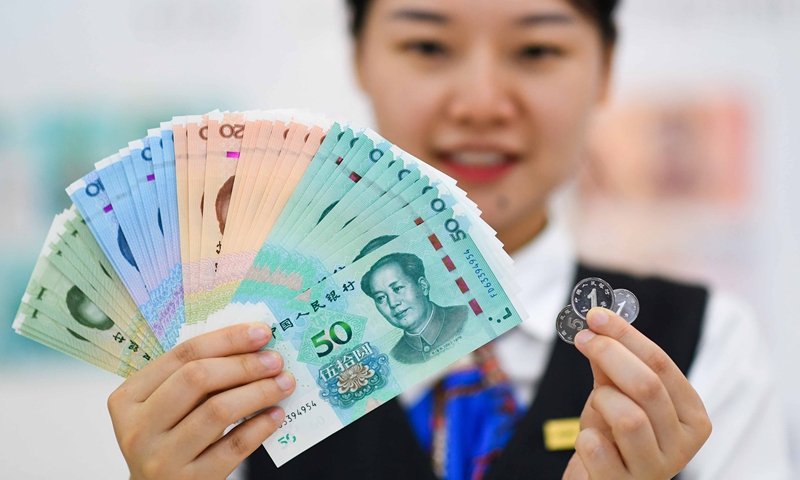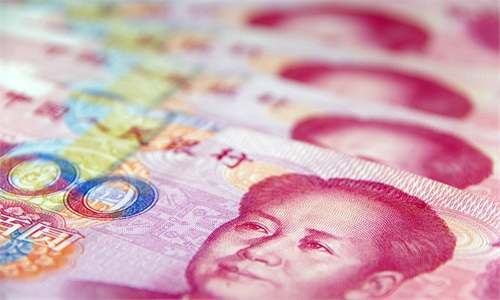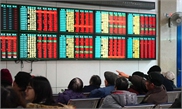Yuan’s use in global forex reserves reach 5-yr high, may rise further amid sanctions between Russia and the West

A staff member displays the banknotes and coins included in the 2019 edition of the fifth series of the renminbi at an Industial and Commercial Bank of China (ICBC) branch in Beijing, capital of China, Aug. 30, 2019.(Photo: Xinhua)
The proportion of claims in Chinese yuan climbed to a new high in total foreign exchange reserves in the last quarter of 2021, latest IMF data showed.
Experts have attributed the change to China's rising economic position and unswerving push for the yuan's internationalization.
They also predicted that the growth of yuan's scale or proportion in the world's foreign currency reserves will speed up this year, as the sanctions between Russia and the West, as well as the ensuing financial chaos, will gradually expose the dangers of sticking to the US dollar or the euro as reserve currencies.
Claims in yuan amounted to $336.1 billion in the fourth quarter of 2021, accounting for 2.79 percent of the total allocated foreign exchange reserves in the fourth quarter last year, according to Currency Composition of Official Foreign Exchange Reserves (COFER) data released by the IMF on Thursday.
The proportion has risen slightly from 2.66 percent in the third quarter of last year, also the highest level since the third quarter of 2016 as shown by the IMF data.
By the end of 2021, the yuan was fifth in the COFER after the US dollar, the euro, the Japanese yen and the pound sterling.
More than half, 58.8 percent, of all central bank currency reserves are still held in US dollars, IMF data showed. However, the US dollar's appeal is gradually declining. In 2007, about 70 percent of all central bank reserves were in US dollars, but the number had dropped to 59.2 percent by the third quarter of last year.
Apart from proportion, the scale of foreign exchange reserves in yuan is also gradually increasing. In the last three months of 2021, claims in renminbi in foreign exchange reserves stood at more than $336 billion, up from $320.1 billion in the third quarter last year.
Experts said such increase in the yuan's proportion and scale is an irreversible trend, as the influence of the yuan rises along with the rise of China's economic power.
As China pushes the yuan's internationalization through measures such as currency swaps, the Belt and Road Initiative and other methods, and as China's foreign trade increases, the channels and demands by overseas countries to use the yuan are also increasing, they said.
"The European and US financial industries are gradually reaching a shared view on decline of the US dollar system, while many industrial models think highly of the yuan's internationalization trend in the long run," said Chen Jia, a research fellow with the International Monetary Institute of the Renmin University of China.
He also told the Global Times that the yuan's rising share is very "precious" considering challenges like hegemony, unilateralism and the new globalization pattern.
Experts stressed that the yuan's position as a major foreign reserve currency will further speed up after the Russia-Ukraine conflict, which has exposed how unsafe it is to rely on the US dollar and the euro.
"The recent mutual sanctions between Russia and the West, and the ensuing financial chaos are gradually exposing the dangers of sticking to the US dollar or the euro as reserve currencies," Xi Junyang, a professor at the Shanghai University of Finance and Economics, told the Global Times.
He added that the growth of the yuan's scale or proportion in the world's foreign currency reserves should speed up following the aforementioned conflicts, predicting that the yuan might become a top three reserve currency for global central banks in the next 10-20 years, as China gradually eases restrictions on capital flow.
Chen also said it's not surprising that the yuan's share in global foreign currency reserves would rise against the background of Russia-Ukraine crisis, considering that some Russian banks have researched financial products that peg the ruble against the yuan after facing financial sanctions from the west. But regional chaos should not be the underlying reason behind the yuan's rising popularity as a reserve currency, he said.



